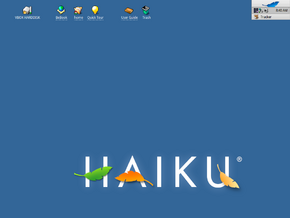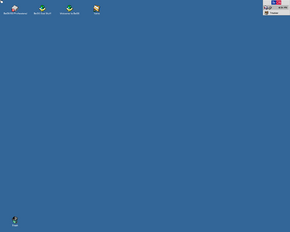User:NaraInsider1694/Sandbox
Haiku
 | |
 | |
| Developer | Haiku, Inc. |
|---|---|
| Latest preview | Haiku R1/beta4 (23 December 2022) |
| Supported platforms | x86 |
| User interface | OpenTracker |
| License | MIT |
Haiku is a free and open-source operating system developed by Haiku, Inc. with BeOS compatibility. The development began as OpenBeOS in 2001, but the name was changed in 2004 to Haiku, in order to avoid infringing on Palm's trademarks. The first alpha release was made in 2009, and the first beta was released in 2018. The system is based on the NewOS kernel (made by Travis G, a former Be Inc. employee) and is BeOS R5 Pro binary compatible.
History
Development
Haiku development began as "OpenBeOS" on 18 August 2001, after Palm, Inc. bought Be Inc. and discontinued BeOS, leaving users and developers without a viable upgrade path and their programs stranded on an unsupported platform. This project differed from several other BeOS-like projects such as Cosmoe and BlueEyedOS, both re-implemented Be's APIs on an existing Unix-like kernel, Haiku is an almost complete rewrite of the system, maintaining binary and source-code compatibility. This meant that existing programs for BeOS could run on the system without being recompiled.
The first release of Haiku was made in 2002 as a community-created update for BeOS 5.0.3 that contains open-source replacements for a few BeOS components. On April 29, OpenBeOS app_server prototype 5 was released and was the first release that was able to render windows. In July 2003, the former project leader Michael Phipps founded Haiku, Inc. to support the project and the development of the Haiku operating system.
In 2004, to avoid infringing Palm's trademark of BeOS, "Haiku" was chosen by an official community vote to reflect the elegance and simplicity that attracted many users to the BeOS platform, and is also a direct reference to the distinctive haiku error messages found in many Be applications. The name was revealed in June on WalterCon.
Several major milestones were achieved during March to April 2005, such as the first graphical applications with full 2D acceleration to run on Haiku itself, and first use of a web browser (Links) on Haiku. Haiku does not use any code or binaries belonging to Be, Inc., including the graphics driver and network card in the original examples. Another major milestone was reached in July 2005, when the system was able to run the BeOS desktop shell, Tracker.
The development continued until Haiku could now be booted and was semi-usable. However, much work remained before the alpha could be released. Network and USB functionality was under heavy development, and the media_server lagged behind the other components. Haiku was unstable as to be expected in a pre-release state. Crashes had been common and no release date had been set. In January 2006, project developer Stephan Aßmus suggested that at the current level of development, R1 was at least a year away, maybe two.
Development on network and USB stacks continued rapidly, and it was expected if these two last major remaining pieces of the operating system were complete, Haiku would be appropriate for day-to-day use by developers and testers. On 12 February 2008, Haiku was reported to become self-hosting, which meant Haiku could be built from within itself.
The milestones continued as time went on, and on 31 January 2009, Haiku obtained a native GCC4 port; this allowed the OS to build modern applications on Haiku at the time (such as Firefox 3). On 12 July 2009, a prototype version of the FreeBSD Wi-Fi stack was ported to Haiku, which enabled unencrypted Wi-Fi connections as a first step.[1]
Alpha and Beta Release
On 14 September 2009, Haiku R1/Alpha1 was released. It was a huge step for the Haiku project and was a demonstrably working (but still an alpha) version of the system for public download and use, and could run live from the CD (unlike BeOS).
Work continued after this release, and three more Alpha releases would be released between 2010 to 2012. After 2012, the project was given attention to implement a package management system for Haiku with its own PackageFS, packages that could be inserted or removed in real-time, and built-in tools like the HaikuDepot and pkgman, however this major aspiration slowed down the time in between releases. After 6 years without any major release, the first beta version would be released in September 2018. In addition to its packaging features, the first beta was also notable for a large amount of system improvements and UI changes that had been made in the years between the last Alpha release and itself.
Release history
| Version | Release date | Revision number | Notes |
|---|---|---|---|
| R1/alpha1 | 14 September 2009 | hrev33109 | First version with basic functionality that is self-hosting |
| R1/alpha2 | 10 May 2010 | hrev36769 | — |
| R1/alpha3 | 20 June 2011 | hrev42211 | — |
| R1/alpha4 | 12 November 2012 | hrev44702 | — |
| R1/alpha4.1 | 15 November 2012 | hrev44702 | — |
| R1/beta1 | 29 September 2018 | hrev52295 | Feature complete in terms of R1 plans |
| R1/beta2 | 9 June 2020 | hrev54154 | — |
| R1/beta3 | 26 July 2021 | hrev55182 | — |
| R1/beta4 | 23 December 2022 | hrev56578 | — |
| R1/beta5 | TBA | TBA | Currently in development. |
See also
References
BeOS
BeOS is a discontinued operating system, first developed by Be Inc. It was originally developed for AT&T Hobbit-based systems but later ported to the PowerPC-based BeBox. It was later ported to PowerPC-based Macintosh models as well as the x86 architecture. It was discontinued in 2001 due to poor market share. Be Inc. later shifted to internet appliances and later bought by Palm Inc. It was succeeded by the yellowTAB Zeta, and OpenBeOS (which later became the Haiku project).
BeOS in emulators
The operating system is notorious for its usage of install media with multiple tracks. This makes it harder to install it in hypervisors, as converting the disc image to a format designed to only store a single track such as ISO 9660 will result in a boot error. Some tools are also known to convert the image into a multi-track format consumable by a VM, although they discard the track information in the process and write a cue file with a single track, leading to the same error. As of 2022, the recommended emulator for BeOS (after R3) is 86Box, as it's not possible to emulate earlier PowerPC-based versions.
Version list
| Version | Release date |
|---|---|
| BeOS DR8 | 1996-09 |
| BeOS PR1 | 1997-06 |
| BeOS PR2 | 1997-10 |
| BeOS R3 | 1998-03 |
| BeOS R3.1 | 1998-06 |
| BeOS R3.2 | 1998-07 |
| BeOS R4 | 1998-11 |
| BeOS R4.5 | 1999-06 |
| BeOS R5 | 2000-03 |
| BeOS R5.1 | 2001-11 |

